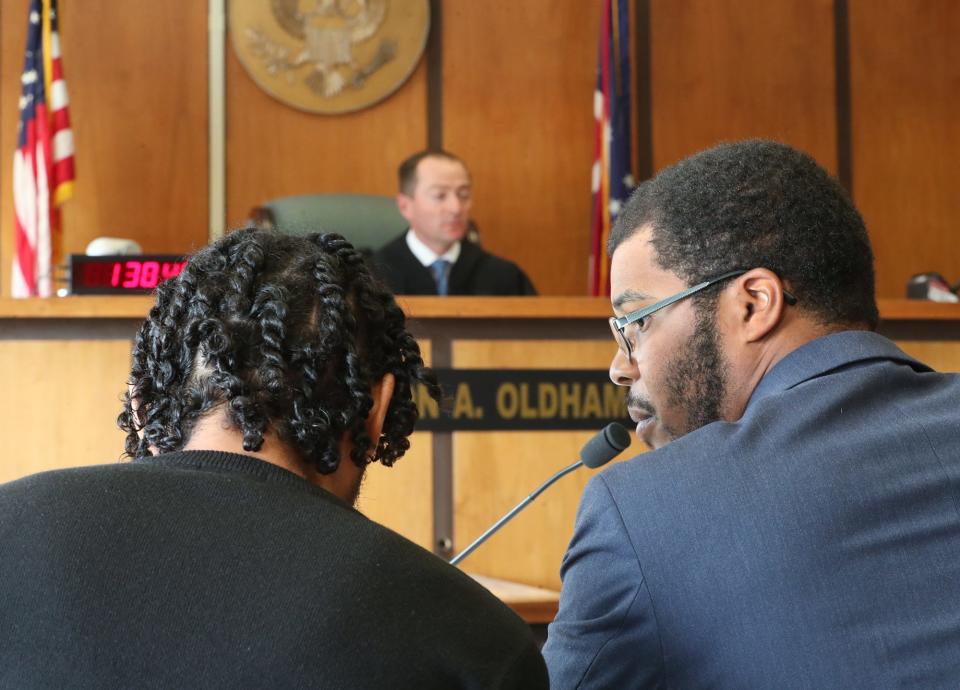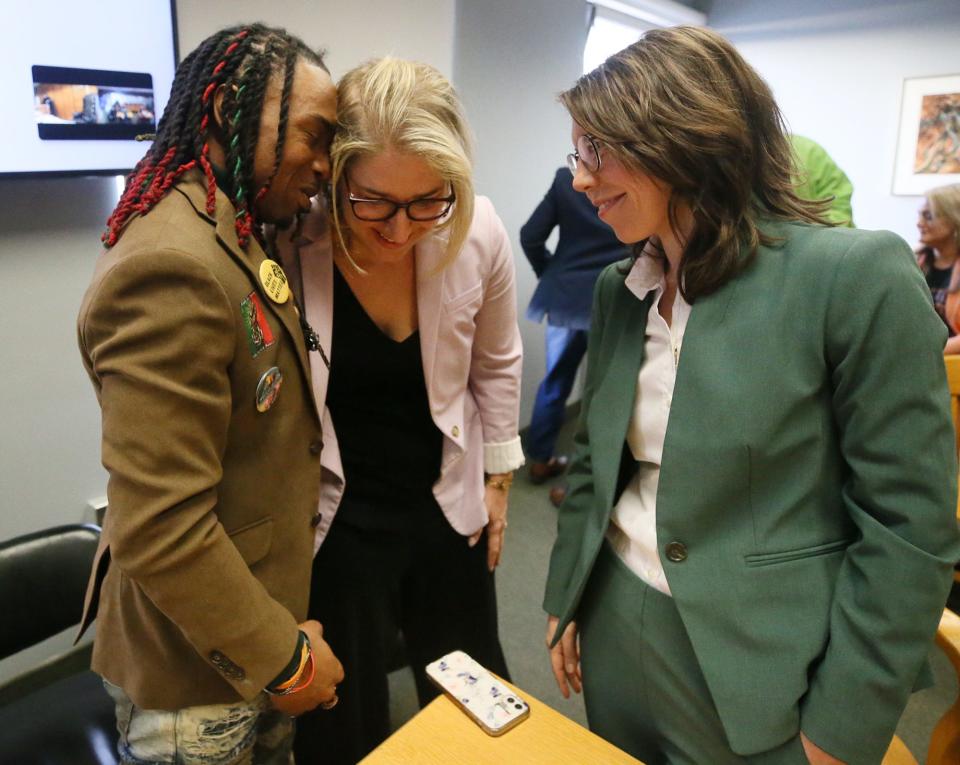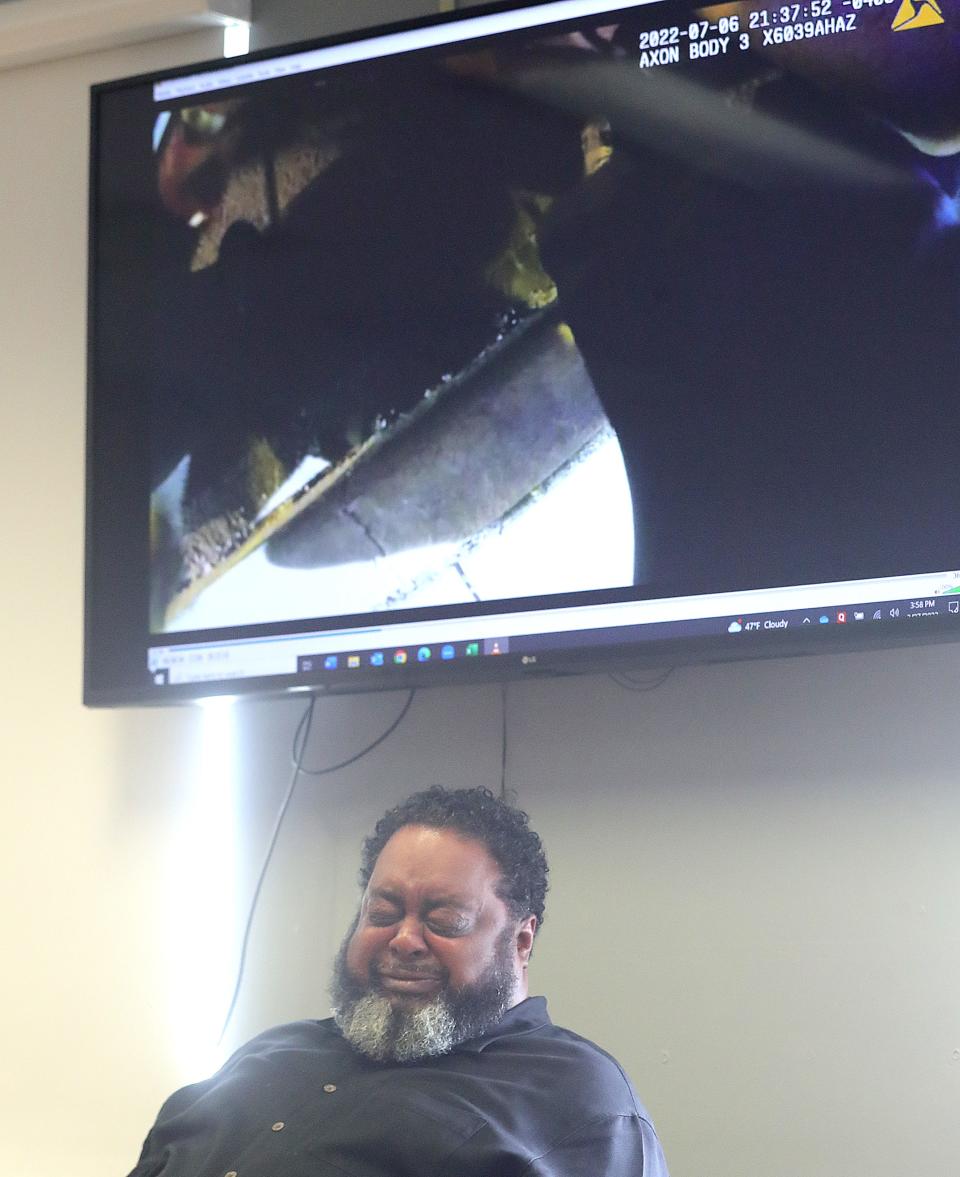Dismissals, acquittals and a few convictions: What happened with 2022 Akron protest cases?
It took nearly a year for a Lorain man’s case related to an Akron protest last summer to make its way through court.
It took an Akron judge less than an hour to hear the evidence and decide the minor misdemeanor charges against Caleb Mays should be dismissed.
Mays, who had to travel to Akron numerous times for court appearances, walked out of the courthouse with no penalties for participating in a protest last July over the fatal shooting of Jayland Walker by Akron police.

Mays’ recent trial, the last in the 62 cases against people arrested during protests between July 3 and 6 of last year, was indicative of the outcomes in most of those cases.
Thirty-eight cases, or more than 60%, were dismissed and 10 cases netted pleas or placements in diversion programs, according to the Summit Legal Defenders Office, which represented most of the people arrested in the protests.
In four cases judges granted Rule 29 motions, which means they dismissed the charges, similar to a summary judgment in a civil case. This request isn’t granted often in criminal cases.
Of the 14 cases that went to trial, seven resulted in not-guilty verdicts, five ended with guilty verdicts on some charges, and two had mistrials, with these cases later dismissed, according the public defender’s office.
“I think the results indicate these individuals were arrested while engaging in protected activity,” said Andrea Whitaker, who heads the public defender’s office.
City Prosecutor Craig Morgan, though, said he is satisfied with the outcome of the cases after a herculean effort by his office to review voluminous evidence that included hours of body-worn camera videos from police.
“What these numbers represent is intentional, thoughtful prosecution,” he said. “We didn’t put everybody in one bucket and either dismiss or throw the book at them. We were looking at each case.”
Morgan disagreed with some of the public defender’s numbers; his office believes, for example, there were 58 cases related to the July 2022 protests, compared to 62 by the public defender's count.
He said the differences could be attributed to people who faced multiple charges, cases that were consolidated, or people who were arrested but weren’t actually protesting.
However, Morgan declined to do an analysis of the differences in the results, saying he couldn’t comment further because of a recent federal lawsuit by 24 of the people arrested during Akron protests. All 24 either had their cases dismissed or were acquitted.
Protesters sue: Federal lawsuit filed against Akron by people arrested during protests last summer
The lawsuit was filed in U.S. District Court in Akron against the city, Mayor Dan Horrigan, Police Chief Steve Mylett and numerous officers. The claims include excessive force, false arrest and imprisonment, malicious prosecution and abuse of power.
The lawsuit seeks compensatory and punitive damages, attorneys’ fees and costs, as well as an injunction against the city for its “unlawful polices and training for the Akron Police Department.”
“We all need to take a stand together,” said Bianca Austin, one of four national activists who were arrested for Akron protests and are part of the federal lawsuit. “If it can happen to us, we know it’s going to happen to you all.”
Austin is the aunt of Breonna Taylor, who was shot and killed in March 2020 in a botched police raid in Louisville, Kentucky.
Akron’s case against her was dismissed.
Protests follow shooting
The protests last summer followed the fatal shooting of Jayland Walker on June 27, 2022.
Walker was shot 46 times by eight Akron officers after fleeing from them first in his car and then on foot.
Walker, 25, was unarmed as he ran, though investigators say he fired a shot out of his car window. After the shooting, a gun was found in his car.
The size of the protests in 2022 ramped up after the city released police body-camera footage of Walker’s shooting, with a large group amassing in downtown Akron on July 3 and 4.
Police arrested more than 50 people and used tear gas to disperse the crowd after numerous buildings were damaged and fires started.

Those arrested were charged with misdemeanors like rioting, failure to disperse and misconduct at an emergency. They spent a day or two in jail and were released after their arraignments, some with cash bonds and others with personal recognizance bonds.
Attorneys request dismissals
Attorneys representing the people arrested during the protests requested in December that about 50 of the cases be dismissed on the grounds that demonstrators were exercising their First Amendment rights and that many of the complaints filed against them were deficient.
“A young man was killed and people came out to express their objections,” Elizabeth Bonham, a Cleveland attorney representing some of the protesters, said at the time. “That’s political speech. It’s a right within the core of the First Amendment.”
The attorneys didn't seek dismissals in the handful of cases that involved charges like criminal damaging and arson involving destruction of downtown property.
City officials defended the mass arrests in court documents, saying the protests had turned from peaceful to destructive.
“Setting fires, shattering windows and bullying a community is not a conversation,” Assistant City Prosecutor Lisa Bradley said in a court document.
None of the cases were dismissed on First Amendment grounds. Judges did, however, throw out several charges in the cases because of deficiencies in the complaints.
The first large group of dismissals happened in January, with prosecutors dismissing 10 cases without prejudice, which means they could be refiled.
Morgan said his office needed more time to review evidence, including body-worn camera video, before deciding if cases should be brought back.
National activists go to trial
Most of the people arrested during the protests were from Northeast Ohio, but four were well-known community activists from out of state.
Austin, Jacob Blake Sr., Michael Harris and Cortez Rice are involved with a group called Families United Against Police Brutality, which supports people across the country who have been involved in cases of alleged police brutality.
Pepper spray, excessive-force claims: What happened during the Jayland Walker Akron protests
Harris' volatile arrest that included him being hit in the face several times by an officer was captured in a video that went viral. He was acquitted in a jury trial in February.
“Justice for Jayland Walker,” Harris, who is from North Carolina, said as soon as he heard the verdict.

Blake, whose son was paralyzed in a police shooting in Wisconsin, had a medical issue during his arrest alongside Harris on July 6, 2022, outside the Akron Police Department. Blake passed out and was taken to the hospital.
Blake became emotional during his trial in March in which body-worn camera video was played that included him yelling in distress.

Blake’s trial resulted in a deadlocked jury, with the judge declaring a mistrial. Prosecutors opted not to retry Blake and dismissed his case.
During Blake’s trial, Sgt. Utomhin Okoh testified that another officer learned that Blake had been paid to protest in Akron. He also said Blake told officers there were no hard feelings after his arrest.
Blake’s attorneys objected and said these statements were incorrect. Ralph Perk, the visiting judge in the case, stopped any further testimony from Okoh and instructed jurors to disregard Okoh’s statements.
Morgan said he isn’t aware of anything happening as the result of Okoh’s testimony, though he suggested checking with police.
Capt. Dave Laughlin said no disciplinary action was taken against Okoh.
Cases against Austin and Rice are dismissed
Austin and Rice were arrested while waiting in the parking lot of the Summit County Jail to post bond for Harris. They faced similar charges to those arrested during the protests – riot, disorderly conduct and failure to disperse.
Austin’s charges were dismissed in March; Rice’s were thrown out in May.
Austin, a single mother who lives in Kentucky, had to travel to Akron five times for court appearances before her case was dismissed.
“This whole thing – I haven’t wrapped my head around it,” Austin said in a recent interview. “I’ve tried to put the experience in the back of my head. ‘Wow. Did this actually happen?’”
Blake, who lives in North Carolina, was pleased to hear that his case wouldn’t be retried.
“It was a relief that I didn’t have to travel back to Akron for that,” he said. “I thanked my creator – immediately.”
People arrested during protests sue the city
The four national activists are among the 24 people arrested in Akron protests who filed a lawsuit June 29 against the city.
The suit claims some of those arrested were roughed up by police and faced hardships during the months their cases were pending in court, including losing jobs, missing work and classes, and having to find transportation and child care to repeatedly go to court.
“The city needs to look at how it's treating First Amendment protected protesters,” said Bonham, one of the Cleveland attorneys representing the protesters. “It cannot be censoring people. It cannot be attacking people. It cannot be prosecuting people.”
City spokeswoman Stephanie Marsh declined to comment on the lawsuit, saying the city doesn’t discuss pending litigation.
A few of the plaintiffs claim they were downtown during the protests but weren’t part of them. This includes a woman who was going out with friends, a man who was having dinner at a downtown restaurant, and a man who was waiting outside the Depot Apartments for his friend to let him inside.
Several people also claim they suffered injuries during their arrests because of tear gas or pepper spray or excessive force.
Jack Rohrer, a Copley man who is part of the lawsuit, said during the public speaking period at a recent Akron City Council meeting that he was tackled and beaten by officers during his July 3 arrest. He said he has scars on his elbow and all the way down his body.
“We see the violence – and we want it to stop,” he said.
Chief Steve Mylett: Change made to protest procedure
Mylett said in a recent interview that police have changed one policy in their approach to handling protest arrests.
Mylett said when officers previously made arrests during protests, they would hand the person off to another officer and return to the protest. The other officer would then take the person to jail.
Mylett said this impacted the quality of the probable cause statements in arrest documents, with some charges being dismissed.
“So, based on that, we made adjustments,” the chief said. “If I go hands on somebody and I make the arrest, I’m walking him through the entire system.”
Asked if the prosecutor’s office will make any changes to how it handles these types of cases, Morgan said they know they need to prepare for mass arrests as much as possible.
Morgan said his office hasn’t refiled any charges against the people whose cases were dismissed. The statute of limitations on misdemeanor charges is two years.
“None of these people have reoffended,” he said. “That will be a critical analysis if we chose to reinstitute a charge. They’re moving in the right direction.”
Whitaker said she doesn’t think any of those cases should be brought back.
“I don’t believe there is evidence to support any of the cases being refiled,” she said.
Stephanie Warsmith can be reached at swarsmith@thebeaconjournal.com, 330-996-3705 and on Twitter: @swarsmithabj. Beacon Journal reporter Doug Livingston contributed to this article.
This article originally appeared on Akron Beacon Journal: Few arrests in protests over Jayland Walker's death end in convictions


